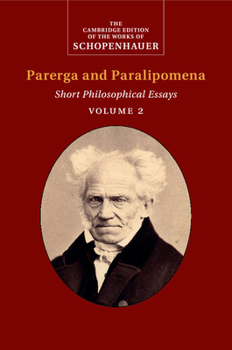Schopenhauer: Parerga and Paralipomena
(Book #5 in the Sämtliche Werke in fünf Bänden (Arthur Schopenhauer) Series)
Select Format
Select Condition 
Book Overview
This is the only complete English translation of one of the most significant and fascinating works of the great philosopher Arthur Schopenhauer (1788-1860). The Parerga (Volume 1) are six long essays;... This description may be from another edition of this product.
Format:Paperback
Language:English
ISBN:1108436528
ISBN13:9781108436526
Release Date:October 2017
Publisher:Cambridge University Press
Length:701 Pages
Weight:2.03 lbs.
Dimensions:1.4" x 6.0" x 9.0"
Customer Reviews
4 ratings
Perfectly pleased
Published by Thriftbooks.com User , 17 years ago
Ordered the much needed book easily and received it in perfect condition in a timely manner. Perfect service. 100% satisfied.
suggested reading
Published by Thriftbooks.com User , 19 years ago
one has plenty of reasons to read Dr.Arthur's book. Be that interst in philosophy as a science, an interest in getting to know the world and society we live in or our own self Dr.Arthur has something to say. Not surprising that both Freud and Nietzche worked on his sayings in order to produce their own works. Excellent, elitistic, contemporary book
Schopenhauer's Claim to Fame
Published by Thriftbooks.com User , 22 years ago
Actually, Parerga was not the book which S. considered to be his masterpiece; The World as Will and Representation was. But it made him famous, especially in England. It's striking too how weak human nature is, even in the case of a man considered to be both a genius and wise. Already rich by inheritance, both supremely intelligent and extremely clever, highly educated, and ultra-cynical about people, the temperamental philosopher craved FAME all his life. (He got it, just before he died.)Not everything S. writes about in this book (or for that matter any of his other books) is relevant or interesting or correct - you may want to skip his physical theory of colors, for example. But the reader does get a sense of the range and brilliance of his multilingual mind. Many of his thoughts are timeless and true everywhere in the world.S. caught my attention not because I'm interested in philosophy generally - I most certainly am not - but rather because he was one of Einstein's heroes, and Einstein is one of mine. Einstein loved to quote him, and apparently had his picture hanging in his office. Interestingly, Hitler also counted S. as his hero. The only book he took to the front as a soldier in the First World War was Schopenhauer's masterpiece, and later as Fuehrer he quoted S. in long, rambling paragraphs in his own table talk. One wouldn't normally expect much in common between the greatest mind who ever lived and this anti-intellectual warmonger. Hitler was an antisemite, so perhaps that's one reason why he was attracted to S. But S. was most liberal and generous in his misanthropic hatreds - one doesn't find him discriminate for or against any particular group. Perhaps Hitler didn't know about the far more damning things S. had to say about Germans? S. influenced many philosophers, such as Nietzsche and Wittgenstein, but I'm not familiar enough with philosophy to elaborate on this point. He also inspired many other creative minds who were not actually philosophers: Richard Wagner (a fanatical devotee to S. and to whom Hitler was also a fanatical devotee), Leo Tolstoy, Thomas Mann, Sir Winston Churchill (mentioned S. in his autobiography My Early Life), and the quantum physicist Erwin Schroedinger, among numerous others. (Notice that the last three were Nobel prizewinners?) Even the sharp-tongued and critical Wolfgang Pauli (another Nobel physicist) took him seriously. If you want to know why S. was so influential, then this is a good place to start. Parerga is easier to read than his other books, with the exception of his two essays on morality. Try to get Vol. I as well, but if you must choose, get Vol. II - it's longer and has a good index, and a good index is always useful in any book. Start with Parerga; then after you're familiar with his philosophy, move on to his main work. But don't forget his Essay on the Freedom on the Will - which stands alone as a real masterpiece in all philosophy, even more outstanding than his other works.
schopenhauer, pessimist good and undefeated
Published by Thriftbooks.com User , 25 years ago
Schopenhauer is still worth the read, maybe even more today in the persistence of the me generation and the collapse of any serious interest in metaphysical speculation. In turn crafty, sentimental, realistic, and realistically bitter, he never fails to stimulate. Even a case for his subtextual optimism might be interesting.





